See what type of label format is best for your business
Other articles you might like:
Businesses just getting started often create their product labels, ingredient labels, warning labels, and logo stickers using label sheets that they print themselves or have professionally printed. And when you only need small quantities, this can make sense.
But as the business grows and orders increase, you may find DIY printing and hand-labeling products are no longer the best options. Or maybe you are ready for upgraded premium materials and finishes that aren’t often available on sheet labels. Then it’s time you should consider ordering roll labels instead of labels on sheets.
What are sheet labels?
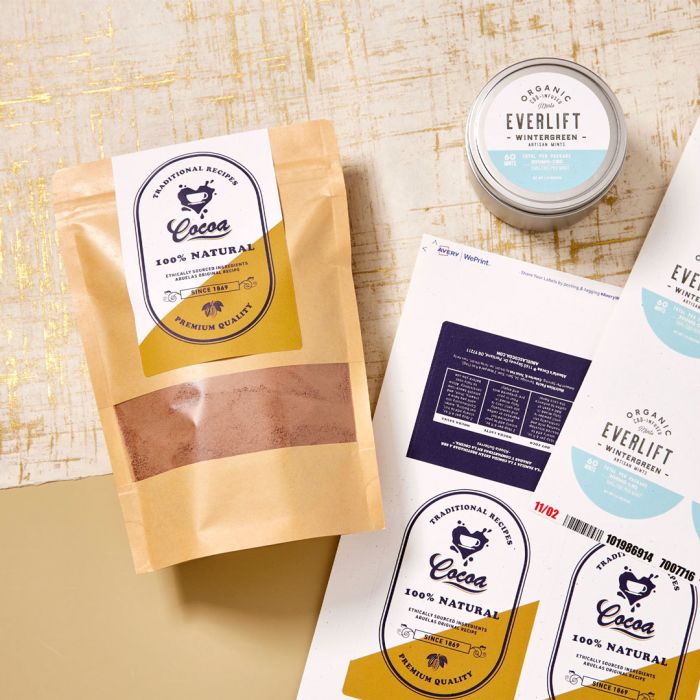
Well, the obvious conclusion is that sheet labels are labels that come on a sheet. Think of a piece of paper. Sheet labels are pre-cut labels that are arranged on 8.5 x 11-inch sheets. They usually have a backing that can be peeled away for easy application.They come in a wide variety of sizes, shapes, and materials, and cater to a variety of needs ranging from product labeling to personal projects.
You can order sheet labels from many companies that you can run through a standard inkjet or laser printer, or you can order professionally printed sheet labels. Avery offers custom sheet labels, blank labels by the sheet, and retail packs of blank labels so you can find the exact type of label you need for your situation.
Professional printers such as Avery WePrint that use digital presses shouldn’t have extra charges for plates or four-color printing on sheet labels. However, if you use flexographic printing, chances are good you’ll incur extra charges. Professional printers with digital presses can provide you with small quantities of sheet labels for a more affordable option and low minimums.
When should you use sheet labels?
One of the biggest reasons to use sheet labels is that they’re convenient for small-scale or occasional labeling needs. Whether DIY or professionally printed, they’re ideal for businesses that don’t need large quantities of labels on a frequent basis. They are also popular in offices where users can print a sheet or two as needed.
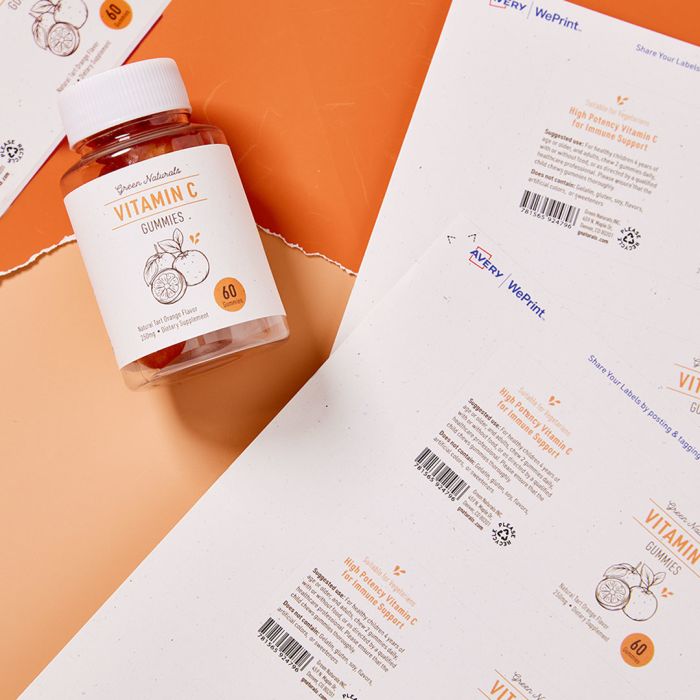
Because sheet labels can be printed using standard inkjet or laser printers, small businesses can create custom designs and print on-demand. If you’re testing a new logo or design for your product labels, sheet labels are an easy, affordable way to do a trial run. You can experiment with different colors, fonts, shapes, and materials, and then try them out, and get opinions from family, friends, and others before committing to a full run of labels you might not like.
Sheet labels are also great for seasonal products. If you only need a short run of your Pumpkin Spice candle labels for the fall, then sheet labels might be the way to go. Another situation where sheet labels could be a good idea is if you have products that change ingredients or regulations frequently, such as cannabis labels.
Printable blank sheet labels let you quickly order and print out labels on-demand, as needed, which is incredibly valuable if you use a label company that allows you to save designs like Avery. If you are on a tight deadline and have your label templates and designs saved, in just a few clicks, you can print quality labels.
What are roll labels?
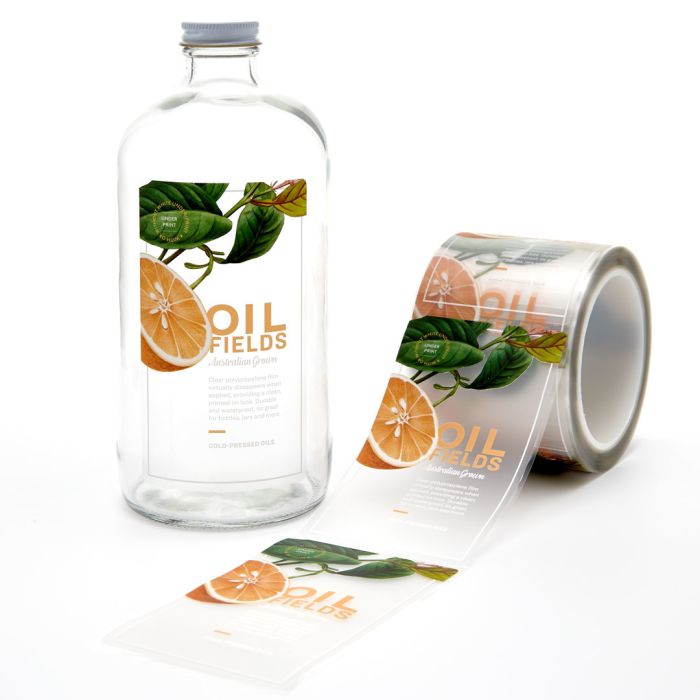
Well, again stating the obvious here, roll labels come on a roll. They’re a continuous strip of labels attached to a liner and wound around a core. Unlike sheet labels, roll labels don’t have any backing material around the outer edge of the label itself. They’re generally made of the same materials and adhesives as sheet labels, they’re just wound around a plastic or cardboard spool instead of on a flat sheet.
With roll labels, you can buy thousands of different sizes and shapes, as well as custom label shapes and sizes. This allows you to be more inventive and creative with your label designs to really make your products stand out. Avery offers both custom roll labels and printable roll labels. For printable roll labels, you must have a inkjet roll label printer.
Custom printed roll labels offer embellishments and finishes you can’t often get on DIY roll labels and sheet labels; things like white ink. This printing technique applies white ink underneath clear labels to create opacity in specific areas. White ink underprint can make your label design more vivid and your text easier to read. Using a professional printer like Avery WePrint that uses digital presses will allow you to create vibrant metallic custom labels. If you want some extra shine on your metallic print, you can add a gloss laminate so your label looks like foil. For a more brushed metal, flat appearance, add a matte laminate over your metallic print.
When should you use roll labels?
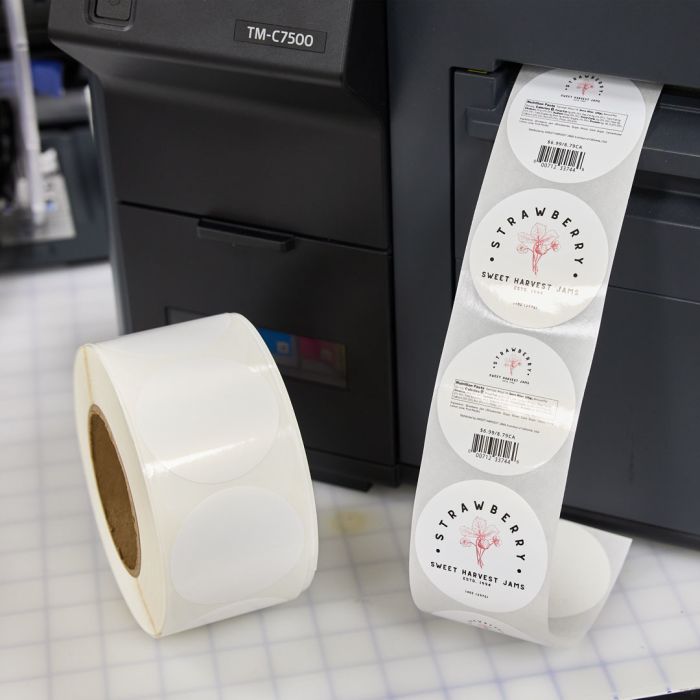
Roll labels are an affordable way to order labels in bulk. They’re very popular with businesses needing longer runs and spending more on their labels. As a general rule of thumb, if you order more than $250 of labels, you’re probably ready to roll. The more you buy, the more you save.
If you plan on using a labeling machine for your products, then it will require you to use roll labels. If you haven’t invested in a label applicator, the good news is, there are a variety of dispensers available to fit your current budget. There are also some guidelines you should follow when choosing the right label applicator.
Even if you don’t have a labeling machine and you’re applying your product labels by hand, roll labels can make the job easier. Simply place your roll labels on a rod or towel rack for easy unwinding and peeling.
Secondary printing
Many companies offer blank labels on rolls, but be aware you need a special printer for printing your roll labels. There are inkjet label printers, thermal label printers, LED label printers, and many more.
So make sure when ordering blank roll labels that you are buying the correct type for your printer. For instance, Avery WePrint offers thermal labels on a glossy white film that allows you to add secondary print on your roll labels but you must have a thermal printer.
Conclusion
Choosing between sheet labels and roll labels ultimately depends on your specific needs and operational scale. Sheet labels are perfect for small projects, offering convenience, flexibility, and ease of customization. They’re great for personal use, small businesses, and office environments where only a small number of labels are needed at a time. On the other hand, roll labels are perfect for in high-volume settings, providing efficiency, scalability, and suitability for automation. They’re the go-to choice for businesses, manufacturing plants, and any operation where consistent quality and rapid labeling are essential.
Understanding the advantages and limitations of each option will help you make an informed decision. Think about things such as the volume of labels you need, the label materials you desire, printing capabilities, and the nature of your application. Whether you opt for sheet labels or roll labels, selecting the right type will streamline your workflow and support your business goals.
Do you still have questions?
Whether you buy your labels from Avery or somewhere else, our friendly Consumer Care Center reps are ready to help. No matter what the label question, we can help you make the best decision for your business. Call us at (800) 942-8379.

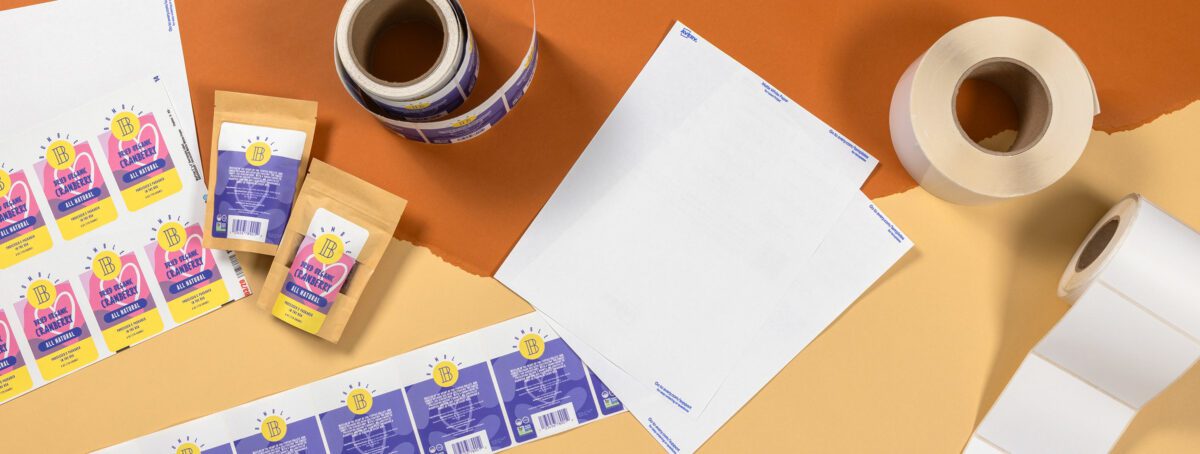
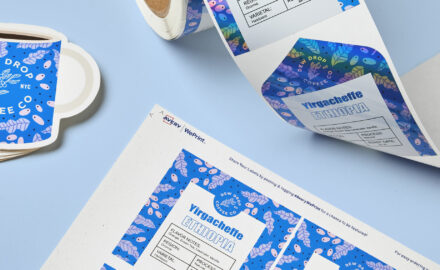
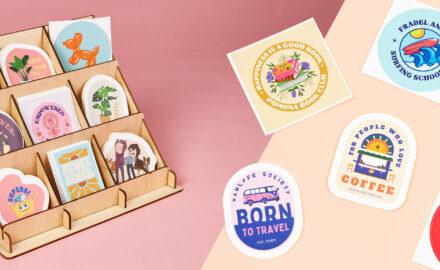
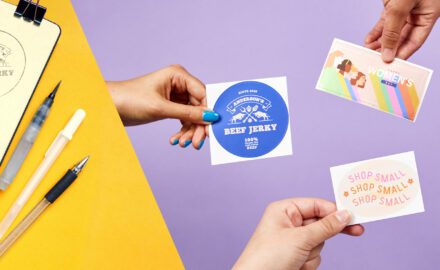
I want to make sure that I get the right labels for a project that I’m working on. It makes sense that getting them custom printed would be beneficial. I’ll be sure to work with a professional to ensure that they end up working nicely.
It sure was nice that you pointed out that if you would be ordering stickers in bulk, it would be wise to order roll labels so you could save more. This is something that I will share with my daughter because she is looking for a labeling company. Her business class at school asks them for a project that would require them to sell items, and she would need a label for each. She wanted to save money, so she will surely consider all your tips.
My brother is wanting to start a woodworking business soon and he is thinking of printing out some stick labels that he can give away to potential customers. I found it interesting when you explained that roll labels are a good way to print stickers in bulk. It seems like it would be a good idea for my brother to find a digital graphics company to work with.
Hello, I am looking for blank roll labels for a laser label printer. Can I order them from you?
Hi Meggan,
At this time we only offer blank roll labels for use with thermal transfer printers. We do offer custom printed roll labels that might work for you or blank sheet labels you can buy online. But we are always looking for new products and innovative ideas to give our customers what they need, so I will definitely pass your comment along to our research and development team. If you’d like more information or need any help, please give our Customer Care Center a call at (800) 942-8379.